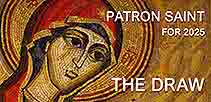“Under the Old Covenant I sent prophets to My people with thunderbolts. Today, I am sending you with My mercy to the whole of mankind” (Diary 1588). Sister Faustina was chosen by God to remind the world of the mystery of His mercy. Not without significance is the historical context in which God sent her with the prophetic mission of Mercy. For in the twentieth century ideologies of evil were created and developed: Nazism and communism. This was and still is a time of unprecedented development in terms of civilization and technology; a time of deep moral decline and departure of man from God; and life “as if God did not exist” on a hitherto unprecedented scale. In this context, it becomes clear that in such times, God gives us a great gift, by sending prophets, to remind us of the truth of His merciful love. This great gift to His people is ‘a sign of the times’, or ‘light’, intended to illuminate our path in the third millennium and inspire hope in our hearts.
In the privacy of the convent and obedient to the monastic rule, Sister Faustina pondered, at first alone, on what God did for man at his creation, how much the Son of God suffered for the redemption, what He left for man in the Church and what He has prepared for man in the glory of heaven. This getting to know the merciful love of God, based on considerations of the word of God, the Church’s liturgy, prayers and daily search for its manifestations in her own life was strengthened by the gift of infused contemplation, as a result of which, she entered deeply into this mystery of our faith, enabling her to proclaim it with a new power to the modern world. At the command of Jesus and her confessors she kept a diary in which she wrote down everything that God let her know and what He told her about His mercy in her mystical experiences. As Pope John Paul II stated, this Diary – “appears as a particular Gospel of Divine Mercy, written from a twentieth-century perspective.” (John Paul II, Memory and Identity).
It is a unique work, not only because it sprang from a mystical experience of Divine Mercy, but also because it contains original thoughts related to this mystery of faith. In the Diary there are no quotes from or comments relating to the texts of Holy Scripture, but the truth it reveals concerning Divine and human mercy – as Bishop Kazimierz Romaniuk noted – “can be regarded as a kind of additional source for (…) theology, which clearly enriches theology”. What strikes everyone in the Diary, is a fascination with the merciful love of God, Father, Son and Holy Spirit, showing this to be the greatest attribute of the Creator and Redeemer; also her desire to pass this message on to the world. Having so great an understanding of the mystery of Divine Mercy – St. Faustina defines mercy very briefly, yet expresses its essence in very profound terms when she writes that “Mercy is the flower of love; God is love, and mercy is His deed, [He is] begotten of love and manifested in mercy” (Diary 651).
1. Mercy – the Attribute of the Triune God
 Divine Mercy in the writings of St. Faustina is an attribute of the whole Trinity: Father, Son and Holy Spirit, not only of the Son of God Incarnate. In the litany she addresses God directly as “Divine Mercy, fountain springing forth from the mystery of the Most Holy Trinity” (Diary 949). The following wordings can be found in other prayers: “O, praised be in the Blessed Trinity, Almighty One, God of mercy” (Diary 1742); “Be adored, Praised be, O Most Holy Trinity… . May the greatness of Your mercy be glorified and honoured, O God” (Diary 5); “O Sacred Host, in which is contained the mercy of the Father, the Son, and the Holy Spirit for us” (Diary 356).
Divine Mercy in the writings of St. Faustina is an attribute of the whole Trinity: Father, Son and Holy Spirit, not only of the Son of God Incarnate. In the litany she addresses God directly as “Divine Mercy, fountain springing forth from the mystery of the Most Holy Trinity” (Diary 949). The following wordings can be found in other prayers: “O, praised be in the Blessed Trinity, Almighty One, God of mercy” (Diary 1742); “Be adored, Praised be, O Most Holy Trinity… . May the greatness of Your mercy be glorified and honoured, O God” (Diary 5); “O Sacred Host, in which is contained the mercy of the Father, the Son, and the Holy Spirit for us” (Diary 356).
To grasp this mercy of God in its fullest sense we need to look to the biblical terms hesed in the Old Testament and eleos in the New Testament. It signifies the true love, goodness and compassion of God. Divine mercy has the characteristics of fatherly love: faithful love, which adopts us as His children (Diary 1745, 1819) and cares for all creation (Diary 244, 288, 361, 438, 522, 525, 1692). Divine mercy falls within the scope not only of the biblical terms: hesed and eleos, but also, when referring to the deepest motive of God’s love, rahamim, His motherly love. In conversations with Jesus, Sister Faustina heard many times about the “very inner depths” of mercy: “My depths are full to overflowing with mercy” (Diary 1784); “Everything that exists has come forth from the depths of My mercy” (Diary 699). Creation is contained in the inmost depths of the Divine mercy more deeply than an infant in the mother’s bosom (Diary 421, 1076). “Rejoice, all you creatures – she wrote – for you are dearer to God in His infinite mercy than a baby to his mother’s heart” (Diary 423). Jesus spoke about this motherly mercy when He gave a promise to all the apostles of Divine Mercy: “I protect souls that spread the worship of My Mercy throughout their lives, as a loving mother protects her baby” (Diary 1075).
Divine mercy in the writings of Sister Faustina is: ‘incomprehensible’, ‘unfathomable’, ‘inexpressible’, ‘inexhaustible’, ‘infinite’, ‘unsurpassable, ‘amazing for the minds of human beings and angels’. The following terms also bear witness to the greatness of Divine mercy: ‘omnipotent’, ‘powerful’ and ‘without limits’. To express the greatness of the mystery of Divine mercy, beyond verbal terms, St. Faustina also used a variety of images, analogies and metaphors. She often spoke of the ‘abyss’, the ‘ocean of mercy’, the ‘sea of mercy’ or the ‘depths of mercy.” When she wanted to emphasize the life-giving power of mercy, she used the metaphor ‘source’, ‘spring’ or ‘stream’. She also used the metaphor of ‘fire’ and ‘flame’ to express the ardour of the love of God for man and that of man for God. Jesus spoke to her directly about burning “flames of mercy” (cf. Diary 50, 177, 1190, 1520).
Sister Faustina called mercy “the greatest attribute of God” (Diary, 949), the term she first heard from Jesus: “Tell the world – Jesus said to her – that mercy is God’s greatest attribute. All the works of My hands are crowned by mercy” (Diary 301). Rev. Prof Ignacy Różycki explains that mercy as an attribute of God is, in the dogmatic sense, equal to other attributes of God, but when it comes to the manifestations of His action in the world, then mercy is actually greater than the other attributes of God, because the effects of this action are the greatest. This distinction between the understanding of mercy as the attribute of God and mercy as His action, is supported, among other things, by such concise wordings of St. Faustina as “Mercy is the flower of love; God is love, and mercy is His deed, [He is] begotten of love and manifested in mercy” (Diary 651). This distinction can be clearly seen in her texts, i.e. mercy as an attribute of God equal to His nature, and mercy as an act – His action toward man.
There are no comments or references to biblical texts in the writings of St. Faustina, but there are very original wordings, which shed new light on the theology of mercy. One such original thought is the self-definition of God as the One who is “Love and Mercy Itself” (Diary, 1074, 1273, 1486, cf. 281), or of Jesus, who speaks of Himself as “King of Mercy” (Diary 83, 88, 367). Such terms do not appear anywhere in Holy Scripture. St.Faustina also explains the inexhaustible nature of Divine mercy, or rather its expansion to meet the extent of human misery, citing the words of Jesus: “I am love and mercy itself; there is no misery that could measure up to My mercy; neither can my Mercy be exhausted by wretchedness, for My mercy increases as it is being dispensed” (Diary 1273). The sense of these words is as follows: the greater the sin, the greater the need for mercy, and consequently the faster it is outpoured, growing ever greater as it is being granted.
Saint Faustina presents the merciful love of God in the context of the whole history of the world and of humanity, that is, since the creation of angels, earth and man; through the Incarnation of the Son of God and His work of salvation; through the establishment of the Church, together with the richness of the graces necessary for human life and sanctity; up to the end of the world, or to the final destiny of man, which is to live in communion with God in the glory of the redeemed. Therefore, the Diary, though it is not a theological study of the mystery of Divine mercy, still provides an opportunity to get to know this mystery in an orderly manner and according to the following plan: the work of creation, salvation and glory. The Diary constitutes a kind of commentary on the Bible, written from the perspective of the mystical experience of the author, and thus very vividly communicates this truth of faith. As a result of its originality and remarkable depth of knowledge concerning the mystery of Divine mercy the Diary amounts to an additional source for the theology of mercy.
2. The call to preach Divine mercy
The prophetic message of St. Faustina has three aims: it allows one to enter more deeply into the mystery of Divine mercy; it brings into the history of the Church a new and distinct expression of devotion to the Divine Mercy; and it includes a call to preach with power this truth of faith.
In the Diary of Sister Faustina Jesus continually repeats His urgent call to: “Tell the world of My mercy, of My love. …do what is in your power to spread the worship of My mercy; I shall complete whatever is wanting in your capacity. Tell distressed humankind to come up and cling to My Heart, and I shall fill it with peace. Tell them, O My daughter, that I am love and mercy itself” (Diary 1074). This call to proclaim the mystery of Divine mercy to the world, Jesus directed not only to Sister Faustina, but also through her to priests (Diary 50, 1521) and to all believers (Diary 48, 742, 1075, 1225, 1572). He wanted the Church to undertake this task anew. “God wants – Sister Faustina wrote down – a congregation to preach Divine mercy to the world and to pray for Divine mercy for the world” (Diary 436). This ‘Congregation’ – as He let Sister Faustina know – is one great work in the Church, which consists of people of different callings (enclosed and active congregations and lay believers), who undertake the task of making the merciful love of God manifest in the world through their testimony of life in a spirit of trust in Him and mercy towards others, by deeds, words and prayers.
To this task – of proclaiming the Divine mercy to the world – the Lord Jesus attaches great importance, since He gives great promises to those who will undertake the task. “I protect souls that spread the worship of My Mercy – He assures – throughout their lives, as a loving mother protects her baby; and at the hour of their death I shall not be a Judge unto them, but their merciful Saviour” Souls who spread the honour of My mercy” (Diary 1075). “I shall endow those priests who preach and glorify My mercy with a singular power, I shall invest their words with special authority, and I shall move the hearts of those to whom they preach” (Diary 1521). The proclamation of the mystery of Divine mercy is to help sinners return to a life of grace, and help the just achieve greater excellence. It is also, according to the words of Jesus, to prepare the world for His second coming. “Secretary of My mercy, write of this, and tell souls about My great mercy, for the terrible day, the day of My justice is close at hand” (Diary 965). Jesus invites the world to benefit from His mercy while the time of mercy lasts, for He will not be able to dispense mercy on the day of justice, on the last day. “The day of judgement has been determined – the Mother of God also reminded – the day of God’s anger, the angels tremble at the thought of it. Tell souls of His great mercy, while there is still time for mercy” (Diary 635). Pope John Paul II issued a reminder of this role of the prophetic message of Mercy during his last apostolic pilgrimage to his homeland. “May the binding promise of the Lord Jesus be fulfilled: from here there must go forth ‘the spark which will prepare the world for His final coming’ (cf. Diary, 1732). This spark needs to be lighted by the grace of God. This fire of mercy needs to be passed on to the world. In the mercy of God the world will find peace and mankind will find happiness!”
The message of Mercy handed down by St. Faustina forms part of a biblical trend of portraying the mystery of Divine mercy and of the teaching of the Church. However, her writings contain original elements. Yet, chiefly, they strike the depths of portraying this mystery of faith, which she was able to learn not only through faith, but also through her mystical experience, thus bringing it closer to the Church and to the world. It should be pointed out that St. Faustina does not limit the mystery of Divine mercy to covering only the work of redemption and the liberation of man from sin, but also sees it in the work of creation. She shows it as an attribute of the whole Trinity, Who in any action ad extra is driven precisely by mercy. All the works of God are crowned with mercy; each creature owes its existence and all the goodness in the order of nature and grace, to the merciful love of God.
Sr. M. Elżbieta Siepak ISMM
Translated by Orest Pawlak
















